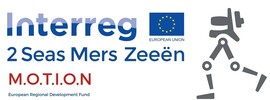MOTION – Mechanised Orthosis for Children with Neurological Disorders
This is a three year project, part of the Interreg 2Seas Programme, and involves 15 cross border partners from the United Kingdom, France, Belgium and the Netherlands and is led by JUNIA HEI. MOTION aims to develop robotic assistive technology – a wearable, lower limb ‘exoskeleton’ – to help children with cerebral palsy (CP) and other neurological conditions stand and walk as part of their rehabilitation therapy.
Project duration: 03-01-2019 to 31-03-2023
Project funding: Total budget: € 7,412,176, ERDF amount: € 4,445,720
Project Objectives
MOTION addresses two challenges:
- Improve the quality of life of children with neurological disorders through advancements in development, validation and adoption of robotic assistive technology.
- Facilitate knowledge and technology transfer from research to industry, healthcare professionals, end users and policy makers by setting up a transregional network.
Expected Outcomes
(i) Advanced development and validation of bionic rehabilitation technology for children with neurological disorders:
- An autonomous and secure lower body exoskeleton for children
- A Smart-textile – a functional, comfortable, attractive garment that integrates the monitoring sensors suitable for children. This will be usable for all applications where monitoring is needed
- Statistical analysis of physiological and biomechanical measurements for practitioners and scientific community
- Base technology applicable to other lower body disorders such as lower limb paraplegia
(ii) Set up a transregional network to transfer technology and related knowledge from research to practical application by linking research, industry, healthcare professionals and users:
- Web-based and face-to-face training packages for health professionals and carers and dedicated to stakeholder community for communication
- A map on assistive technology dedicated to health authorities and SMEs
University of Kent Contribution and Team
The team at the University of Kent will primarily be involved in developing the Assistive Technology including the design, testing, validation and delivery of the exoskeleton prototype. They will also assist with the development of the garment rehabilitation technology accompanying the exoskeleton. The Kent Robotics team, led by Dr Konstantinos Sirlantzis, has an internationally established research and publications record in electronics design, robotics control and vision, and artificial intelligence algorithms and has experience in trials of exoskeleton as a rehabilitation device.
Team members:
Konstantinos Sirlantzis, Gareth Howells, Chee Siang Ang, Christos Efstratiou, Sanaul Hoque, Yong Yan
Partners
JUNIA HEI, Centexbel, Thomas More, University of Greenwich, Rehabilitation Centre for Children and Youth Pulderbos, Sussex Community NHS Foundation Trust, University of Kent, Kinetic Analysis, CEA Hauts de France, Sint Maartenskliniek, CEA – LETI, Kent Surrey Sussex AHSN Limited, Canterbury Christ Church University, KU Leuven
Observer Partners
Belgische Beroepsvereniging voor Orthopedische Technologieën (BBOT), Christelijke Mutualiteiten België, Groupement Hospitalier de l’Institut Catholique de Lille, Injéno, Pacquet Industrie, Pole De Competitivite Up-Tex, Centre d’expertise et de Ressources Nouvelles Technologies et communication de APF France handicap, Centre Hospitalier Régional Universitaire de Lille, Petit Bateau
